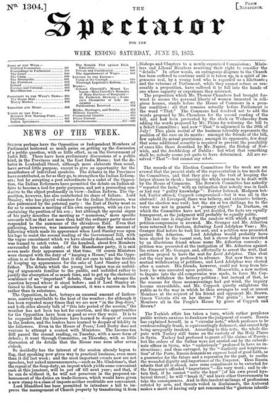NEWS OF THE WEEK.
SELDOM perhaps have the Opposition or Independent Members of Parliament bestowed so much pains on getting up the discussion of a public question, with so little effect, as on the Government of India Bill. There have been preliminary discussions of a public kind, in the Provinces and in the East India Rouse ; but the de- bates in Leadenhall Street, although more elaborate than usual, have served little purpose, except to give an opportunity for the manifestoes of individual speakers. The debates in the Provinces have contributed, so far as they go, to strengthen the Indian Reform- ers; but by accepting a post subordinate to a cadet of the Opposi- tion, the Indian Reformers have permitted the debate on Indian ad- fairs to become a tool for party purposes, and not a proceeding con- ducive to the object professedly in view—Indian Reform. The Op- position, however, has also contributed its share of failure. Lord Stanley, who has played volunteer for the Indian Reformers, was also patronized by the paternal party : the Earl of Derby went so far as to summon a meeting of his own supporters, with an eye to sustaining the position of his son ; but although the special organ of his party describes the meetino. as "numerous," more specific accounts tell us that not more than half the ordinary party muster responded to the summons of the chivalrous Earl. Even that gathering, however, was immensely greater than the amount of following which made its appearance when Lord Stanley rose upon his legs to resist the second reading of the Government Bill, with the vague amendment which we have already described, and which was framed to catch votes. Of the hundred about five Members surrounded the noble cadet; of the Manchester party, it is said seven made their appearance at that time. Of course Ministers were charged with the duty of "keeping a House," and the Oppo- sition is so far demoralized that it did not care to take the trouble of keeping up appearances for the sake of Lord Stanley and his father. The debate which the young lord began was an unfold- ing of arguments familiar to the public, and unfolded rather to justify the absorption of so mach time, and to get up the rhetorical semblance of an "important" debate, than really to advance the question beyond where it stood before ; and if Lord Stanley at- tained to the honour of an adjournment, it was a success in form rather than in substance.
The Opposition, in fact, betrays an unusual amount of listless- ness, scarcely ascribable to the heat of the weather ; for although it has been repeated many times that we are now "in the Dog-days," and bath sides already talk of "this late period of the session," the weather has not been too hot for exertion, and the opportunities for the Opposition have been as good as ever they were. It is to be supposed that the followers have learned to despair of success in the leaders, and the leaders have learned to despair of fidelity in the followers. Even in the House of Peers,: Lord Derby does not venture to attempt a contest with Ministers. The Income-tax Bill passed the second reading, on Tuesday, with a mere form of debate ; it went through Committee, on Thursday, with so little discussion of its details that the House rose soon after seven o'clock.
So decidedly has the interest of the session already begun to flag, that speaking now gives way to practical business, even more than it did last week ; and the most important events now are not speeches, but naked announcements,—such as Mr. Gladstone's, that the repeal of the Soap-duty, an impost which yields some convenient cash at this juncture, will be put off till next year; and that, if he can do without it, he will not persevere in the proposed en- hancement of the duties on trade-licences, which would have given a new stamp to a class of imposts neither creditable nor convenient.
Lord Blandford has been permitted to introduce a bill to im- prove the management of Church property by transferring it from
.Bishops and Chapters to a newly-organized Commission; Minis- ters and Liberal Members reserving their right to consider the "details." In other words, an outrageous disgrace to the Church has been suffered to continue until it is taken up, in a spirit of in- genuous zeal, by a young lord who is regarded as a dilettante ; and, the veterans of Parliament, while they cannot refuse so rea- sonable a proposition, have suffered it to fall into the hands of one whose capacity or experience they mistrust. The proposition which Mr. Thomas Chambers had brought for- ward to secure the personal liberty of women immured in reli- gious houses, stands before the House of Commons in a pecu- liar condition : all that remains actually before Parliament is the word "That." The Commons had resolved not to add the words proposed by Mr. Chambers for the second reading of the bill, and had been prevented by the clock on Wednesday froni adding the words proposed by Mr. Phinn for referring the bill to a Select Committee ; and now " That " is adjourned to the 20th of July ! This plain recital of the business tolerably represents the position of the case on its merits : amongst the friends of the bill, few uphold its actual provisions ; amongst its opponents, few deny that some additional security is required to prevent the possibility of cases like those described by Mr. Napier, the Bishop of Nor- wich, and the Archbishop of Dublin : but what that something shall be, nobody seems yet quite to have determined. All are re- solved "That "—but cannot say what.


























